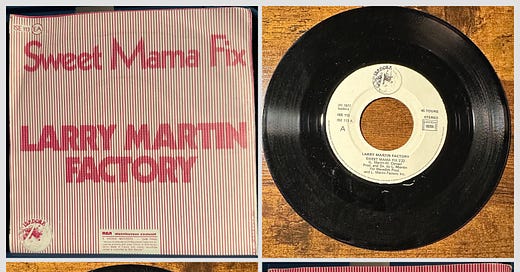Monday Music: A Lost Piece of Heroin Chic
The French Band Larry Martin Factory Made Little Impact in the United States, but This Track Deserves a Hearing
The Larry Martin Factory was a French band during the punk and post-punk era that made little impact in the United States. According to the Last.fm website — which may not be as reliable as some others— describes the band (later known as LMF) as a cult act that was “so way above anything currently around”— in France, I assume “that it really blows your mind.”
France, at the time, was “bogged down in the most syrupy kind of musical drivel.” The music of the Larry Martin Factory offered a “poisonous thrill,” an “ambience of sneery sarcasm and threat.”
I can only assume that this is an accurate description, given the available music — mostly stray singles uploaded to YouTube — and a 45-rpm record I found in a local record store back in 1980 or 1981. I had no idea what this thing was when I found it, but the title was intriguing. I was listening to the Velvet Underground, the Jim Carroll Band and some of John Lennon’s heroin records (“Yer Blues” and “Cold Turkey”), reading Burroughs and Kerouac and Samuel Taylor Coleridge. So the title intrigued me.
The song is a ballad, a slow-building piano-driven song with simple lyrics presented in an almost deadpan manner, as the singer offers a cryptic tale of a woman struggling against the day, against life, against struggle itself. It opens with piano and a snaky, bending guitar (I think), as the singer begins:
Like a tiger tremblin' in the jungle In the mornin' she lies But she knows she's gonna stumble when she suddenly dies
A reference to Blake1, perhaps, a sense of doom. But redeemed or buried, no optimism, just escape. The refrain underscores this, the singer in his half-whisper playing at sexuality, but sounding more exhausted, more frayed than sensual:
Sweet mama fix Death on your lips you know every trick Sweet mama fix, fix
The song unfolds in three verses with the refrain repeated after each, punctuating the damage outlined in the verses but also collecting new meanings each time through — the “fix,” a term for the daily heroin shot, addresses death, the “lost names,” a “hole in the sky.”
The rush of the fix provides a false mitigation for the despair, a failed relief. The fix only makes it worse, further damages the junky. Further divorces the addict from what matters in this life, the lie of drug-induced enlightenment dragging him to the depths.
Should we read this as metaphor. and for what? I don’t have the kind of biographical details that would allow me to connect this song to the musicians’ experience — unlike Lou Reed, Jim Carroll, John Lennon, and others. But it strikes me that the notions of false prophets and escape matter even more today when I listen than they did when I came upon this record.
We live in a time when escape might seem attractive, as a crushing fascism descends on us. But we cannot give in, cannot allow them to overwhelm us. Escape is not an option. Fighting back is our only choice.
That’s not an obvious argument being made by the song, but it is what I hear now. We can be lulled into sleep, into obedience, chase a false light, but the ills will remain there when we recover, if we recover.
William Blake, “The Tiger,” https://www.poetryfoundation.org/poems/43687/the-tyger




